|
Books Should Be Free Loyal Books Free Public Domain Audiobooks & eBook Downloads |
|
|
Books Should Be Free Loyal Books Free Public Domain Audiobooks & eBook Downloads |
|
Non-fiction |
|---|
|
Book type:
Sort by:
View by:
|
By: Mary Antin (1881-1949) | |
|---|---|
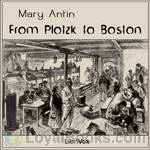 From Plotzk to Boston
From Plotzk to Boston
An intensely personal account of the immigration experience as related by a young Jewish girl from Plotzk (a town in the government of Vitebsk, Russia). Mary Antin, with her mother, sisters, and brother, set out from Plotzk in 1894 to join their father, who had journeyed to the “Promised Land” of America three years before. Fourth class railroad cars packed to suffocation, corrupt crossing guards, luggage and persons crudely “disinfected” by German officials who feared the cholera, locked “quarantine” portside, and, finally, the steamer voyage and a famiily reunited... | |
By: Mary Eales | |
|---|---|
 Mrs. Mary Eales's receipts. (1733)
Mrs. Mary Eales's receipts. (1733)
| |
By: Mary Eaton (fl. 1823-1849) | |
|---|---|
 The Cook and Housekeeper's Complete and Universal Dictionary; Including a System of Modern Cookery, in all Its Various Branches, Adapted to the Use of Private Families
The Cook and Housekeeper's Complete and Universal Dictionary; Including a System of Modern Cookery, in all Its Various Branches, Adapted to the Use of Private Families
| |
By: Mary Elizabeth Braddon (1835-1915) | |
|---|---|
 Aurora Floyd Volume 2
Aurora Floyd Volume 2
Aurora Floyd is the spoiled, impetuous, but kind hearted daughter of Archibald Floyd, a wealthy banker and his wife, an actress who died shortly after Aurora's birth. As a teenager she is sent away to finishing school in Paris. This is volume two of the story which tells of Aurora's life with her husband John Mellish. This is a story of love, murder and the search for justice. - Summary by Michele Eaton | |
By: Mary Everest Boole (1832-1916) | |
|---|---|
 Philosophy and Fun of Algebra
Philosophy and Fun of Algebra
Mary Everest Boole (1832-1916) was born Mary Everest in England and spent her early years in France. She married mathematician George Boole. She was the author of several works on teaching and teaching mathematics in particular. This short book, Philosophy and Fun of Algebra, is meant to be read by children and introduces algebra and logic. She uses the word “algebra” broadly, defining it as a “method of solving problems by honest confession of one’s ignorance”. Using this definition, Boole introduces, in a conversational manner, the concepts of logic and algebra, illustrating these concepts with stories and anecdotes, often from biblical sources... | |
By: Mary Finley Leonard (1862-1948) | |
|---|---|
 Candle and the Cat
Candle and the Cat
"To the memory of TROLLEY, This little story is dedicated." When young Caro goes to stay with her Aunt and Grandfather, the seminary president, she learns to not be afraid of the dark and to "be a candle" by "sharing her light" with the help of Trolley the cat. In doing so, she is able to help others, including a reclusive invalid, renew their old friendships. - Summary by JHedrick | |
By: Mary H. Kingsley | |
|---|---|
 Travels in West Africa
Travels in West Africa
Mary Henrietta Kingsley (13 October 1862 – 3 June 1900) was an British explorer and writer who greatly influenced European ideas about Africa and its people. Kingsley was an outspoken critic of European colonialism, a champion for indigenous customs, and a dedicated campaigner for a revised British policy which supported traders and merchants over the needs of settlers and missionaries. Her adventures were extraordinary and fascinating. Among other things she fought with crocodiles, fell into native spear traps and was caught in a tornado on the slopes of Mount Cameroon... | |
By: Mary H. Northend (1850-1926) | |
|---|---|
 Remodeled Farmhouses
Remodeled Farmhouses
"There is a certain fascination connected with the remodeling of a farmhouse. Its low, raftered interior, its weather-beaten exterior, never fail to appeal. Types vary with the period in which they were built, but all are of interest. In this collection, which has been pictured with great care, pains have been taken to show as many different types as possible, so that the student will be able to find numerous interesting details that can be incorporated into his contemplated remodeling." [opening lines of Preface] | |
By: Mary Harrison | |
|---|---|
 The Skilful Cook A Practical Manual of Modern Experience
The Skilful Cook A Practical Manual of Modern Experience
| |
By: Mary Hooper (1829-1904) | |
|---|---|
 Nelson's Home Comforts Thirteenth Edition
Nelson's Home Comforts Thirteenth Edition
| |
By: Mary Huestis Pengilly | |
|---|---|
 Diary Written in the Provincial Lunatic Asylum
Diary Written in the Provincial Lunatic Asylum
Mary Pengilly was taken to a Lunatic Asylum by her sons where she kept a diary, which this book is taken from. Mary records the harsh conditions and treatments received at the hands of the nurses during her stay. Once Mary is released she takes it upon herself to make the authorities aware of the situation at the Provincial Lunatic Asylum. | |
By: Mary Hunter Austin (1868-1934) | |
|---|---|
 The Land of Little Rain
The Land of Little Rain
The Land of Little Rain is a book of sketches which portray the high desert country of southern California, where the Sierras descend into the Mojave Desert. Mary Austin finds beauty in the harsh landscape: "This is the sense of the desert hills--that there is room enough and time enough. . . The treeless spaces uncramp the soul." Her story begins with the water trails that lead toward the few life giving springs--the way marked for men by ancient Indian pictographs. Life and death play out at these springs... | |
By: Mary Johnson Bailey Lincoln | |
|---|---|
 Carving and Serving
Carving and Serving
| |
By: Mary Kennedy Core | |
|---|---|
 The Khaki Kook Book
The Khaki Kook Book
We cannot ignore the fact that we must eat, and that much as we dislike to acknowledge it, we are compelled to think a great deal about filling our stomachs. This is especially true these days, when prices have soared and soared and taken along with them, far out of the reach of many of us, certain articles of food which we heretofore have always felt were quite necessary to us. About ten years ago the idea of writing a little cook book had its birth. We were in Almora that summer. Almora is a station far up in the Himalayas, a clean little bazaar nestles at the foot of enclosing mountains... | |
By: Mary Randolph | |
|---|---|
 The Virginia Housewife
The Virginia Housewife
| |
By: Mary Rhodes Waring Henagan | |
|---|---|
 Two Diaries From Middle St. John's, Berkeley, South Carolina, February - May, 1865
Two Diaries From Middle St. John's, Berkeley, South Carolina, February - May, 1865
Two diaries from Middle St. John’s, Berkeley, South Carolina, February – May, 1865. Journals kept by Miss Susan R. Jervey and Miss Charlotte St. Julien Ravenel, at Northampton and Poooshee Plantations, and reminiscences of Mrs. Henagan. With two contemporary reports from Federal officials. Published by the St. John’s Hunting Club, Middle St. Johns, Berkeley, South Carolina, 1921. - Summary by Book title and david wales | |
By: Mary Rowlandson (c.1637-1711) | |
|---|---|
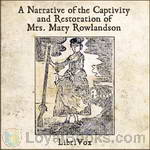 A Narrative of the Captivity and Restoration of Mrs. Mary Rowlandson
A Narrative of the Captivity and Restoration of Mrs. Mary Rowlandson
This is the story of Mary Rowlandson’s capture by American Indians in 1675. It is a blunt, frightening, and detailed work with several moments of off-color humor. Mary, the wife of a minister, was captured by Natives during King Philips War while living in a Lancaster town, most of which was decimated, and the people murdered. See through her eyes, which depict Indians as the instruments of Satan. Her accounts were a best-seller of the era, and a seminal work, being one of the first captivity narratives ever published by a woman... | |
By: Mary Schenck Woolman (1860-) | |
|---|---|
 The Making of a Trade School
The Making of a Trade School
| |
By: Mary Stoyell Stimpson | |
|---|---|
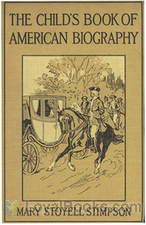 The Child's Book of American Biography
The Child's Book of American Biography
In every country there have been certain men and women whose busy lives have made the world better or wiser. The names of such are heard so often that every child should know a few facts about them. It is hoped the very short stories told here may make boys and girls eager to learn more about these famous people. (from the Forward of the text) | |
By: Mary Swartz Rose (1874-1941) | |
|---|---|
 Everyday Foods in War Time
Everyday Foods in War Time
| |
By: Mary Wollstonecraft (1759-1797) | |
|---|---|
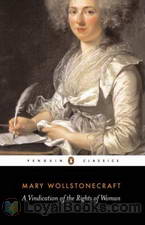 A Vindication of the Rights of Woman
A Vindication of the Rights of Woman
Regarded as the one of the earliest examples of feminist philosophy, A Vindication of the Rights of Woman is written as a direct response to Charles Maurice de Talleyrand-Périgord, a French politician who delivered a report to the French National Assembly suggesting that women should only receive domestic education and additionally encourages women to stay clear of political affairs. In her treatise, Wollstonecraft avidly criticizes this inadequate perception of women as an inferior sex and attacks social inequality, while also arguing for women’s rights in the hope of redefining their position both in society and in marriage... | |
 Letters Written During a Short Residence in Sweden, Norway and Denmark
Letters Written During a Short Residence in Sweden, Norway and Denmark
Published in 1796, Letters Written During a Short Residence in Sweden, Norway, and Denmark is a personal travel narrative by the eighteenth-century British feminist writer Mary Wollstonecraft. The twenty-five letters cover a wide range of topics, from sociological reflections on Scandinavia and its peoples to philosophical questions regarding identity. Published by Wollstonecraft's career-long publisher, Joseph Johnson, it was the last work issued during her lifetime. Wollstonecraft undertook her tour of Sweden, Norway, and Denmark in order to retrieve a stolen treasure ship for her lover, Gilbert Imlay... | |
 Original Stories from Real Life
Original Stories from Real Life
Mary Wollstonecraft was one of the early promoters of gender equality long before other crusaders took up the cause. She is perhaps best known for her books, “A Vindication of the Rights of Women” and “A Vindication of the Rights of Men” . But she also wrote widely on education and used fiction formats to promote her progressive views. This book using the genre of didactic children’s stories, was written the same year as her “Mary: A Fiction” 1788, but was first published anonymously... | |
By: Matthew Luckiesh (1883-1967) | |
|---|---|
 Artificial Light Its Influence upon Civilization
Artificial Light Its Influence upon Civilization
| |
By: Max Stirner (1806-1856) | |
|---|---|
 The Ego and His Own
The Ego and His Own
In this book, his most famous, Max Stirner presents a philosophical case for a radical egoism that shuns the socially-oriented outlooks of both "establishment" ideologies and of revolutionaries in favor of an extreme individualism. The book is most widely talked about today only through the lens of other philosophers' thought: Karl Marx and Friedrich Engels launched a famous assault on it in The German Ideology, and some draw a connection between Stirner's thoughts here and Nietzsche's egoism a generation later. But it is worth reading in its own right, as much for its lyricism as the challenge of its philosophical proposals. | |
By: May Ayres | |
|---|---|
 Health Work in the Public Schools
Health Work in the Public Schools
| |
By: May Kellogg Sullivan | |
|---|---|
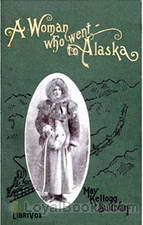 A Woman Who Went to Alaska
A Woman Who Went to Alaska
Alaska has only been a state since 1959, and the breathtaking terrain remains mostly unspoiled and natural. In modern times, many of us have had the pleasure of visiting Alaska via a luxurious cruise ship, where we enjoyed gourmet meals, amazing entertainment, and a climate-controlled environment. It's easy to also book a land package that enables you to see more of the country by train.Imagine what it was like to visit the same wild, untamed countryside in 1899. Instead of boarding a sleek, stylish cruise ship, you travel for weeks on a steamer... | |
By: Melvin Powers (author still living) | |
|---|---|
 A Practical Guide to Self-Hypnosis
A Practical Guide to Self-Hypnosis
Published in 1961, A Practical Guide to Self-Hypnosis by Melvin Powers is a self help book that aims to bring the basic techniques of hypnosis to the ordinary reader and harness its legendary powers to one's own advantage. In fact, all forms of hypnosis are essentially self-hypnosis since the process does not work without the overt or covert cooperation of the person who is being hypnotized. The main difference is that all other forms of hypnosis require the guidance of a therapist or hypnotist while the one suggested here is a self-guided procedure... | |
By: Meredith Nicholson (1866-1947) | |
|---|---|
 Broken Barriers
Broken Barriers
Life abruptly changes for young socialite, Grace Durland., when her father goes bankrupt and she is forced to earn a living. Thrust into a new life, she meets -- and falls in love with -- a married man. She faces condemnation from friends and family alike, and although Ward Trenton reciprocates her feelings, his wife refuses him a divorce. Once again, fate intervenes in the form of a serious accident. - Summary by Lynne Thompson | |
By: Michael Combrune | |
|---|---|
 Theory and Practice of Brewing
Theory and Practice of Brewing
This is an elaborate treatise on how to brew beer. That art is as noble today as it was in 1761, when this book was first published, and Mr. Combrune was a master of his art. After reading his work on this topic, a glass of beer can be enjoyed on quite a different level. - Summary by Carolin | |
By: Michael Faraday (1791-1867) | |
|---|---|
 The Chemical History of a Candle
The Chemical History of a Candle
The Chemical History of a Candle is a series of 6 lectures on chemistry presented to a juvenile audience in 1848. Taught by Michael Faraday - a chemist and physist, and regarded as the best experimentalist in the history of science - it is probably the most famous of the Christmas Lectures of the Royal Society. Taking the everyday burning of a candle as a starting point, Faraday spans the arc from combustion and its products, via the components of water and air (oxygen, hydrogen, nitrogen, carbon), back to the type of combustion that happens in the human body when we breathe... | |
By: Michael Müller (1825-1899) | |
|---|---|
 Public School Education
Public School Education
| |